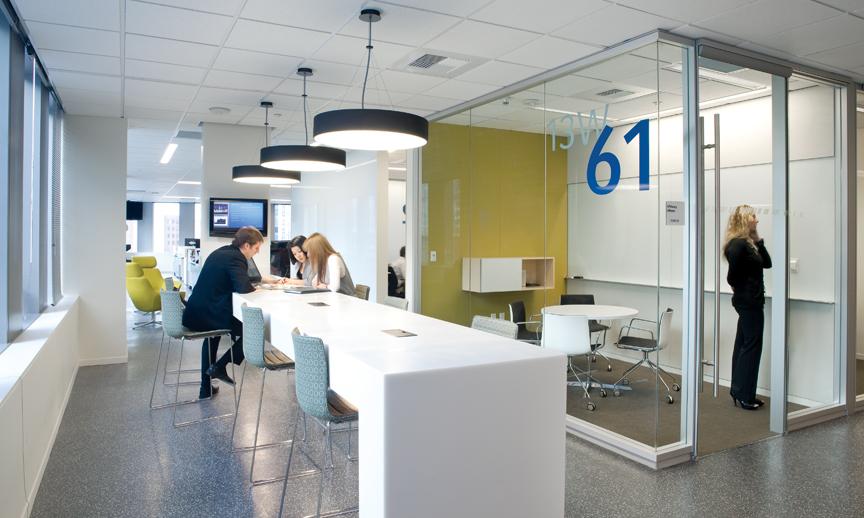Companies throughout America are investing in leading-edge technology in order to boost worker productivity, according to a Workplace of the Future survey.
Key findings of the survey include ninety percent of companies plan to increase investment in technology; cloud computing is a strategy 46% of companies are currently employing; the majority of companies, 54%, are using social media networks to engage employees; and top knowledge recruitment factors include offering flexible workplace options (41%) and leading-edge technology (39%).
“Revolutionary emerging technologies are transforming corporate real estate and changing the game for corporate occupiers,” said Peter Miscovich, managing director, corporate solutions, Jones Lang LaSalle, Chicago. “Emerging technologies are enabling new levels of workplace optimization and utilization as well as boosting productivity to levels never seen before in global organizations, leading knowledge workers into new frontiers of high performance collaboration and innovation.”
The survey was administered to approximately 30 leading U.S. companies and design firms by Teknion, a Toronto-based office furniture designer and manufacturer, revealed that nearly 90% plan to increase their investment in productivity-enabling technologies such as voice-activation and sophisticated video conferencing by 2015. The survey also found that by 2015, the standard of square feet allocated per employee is expected to drop from 200 to estimates ranging from 50 to 100 square feet per person dependent upon the industry sector. Workplace utilization factors will increase to 85% versus the 35 to 50% levels of today.
To increase space utilization, companies are employing several strategies including:
- More open, collaborative workspaces with less individual offices (77%).
- Densification of individual workspaces within the corporate office (62%).
- Reduce square footage footprint through disposition (54%).
- More employees working remotely from home sites, satellite sites, or client sites (46%).
- Mobile working programs that include desk-sharing and co-working spaces (31%). BD+C
Related Stories
| Nov 15, 2010
Gilbane to acquire W.G. Mills, Inc.
Rhode Island-based Gilbane Building Company announced plans to acquire W.G. Mills, Inc., a construction management firm with operations based in Florida. The acquisition will dramatically strengthen Gilbane’s position in Florida’s growing market and complement its already established presence in the southeast.
| Nov 11, 2010
Saint-Gobain to make $80 million investment in SAGE Electrochromics
Saint-Gobain, one of the world’s largest glass and construction material manufacturers, is making a strategic equity investment in SAGE Electrochromics to make electronically tintable “dynamic glass” an affordable, mass-market product, ushering in a new era of energy-saving buildings.
| Nov 11, 2010
Saint-Gobain to make $80 million investment in SAGE Electrochromics
Saint-Gobain, one of the world’s largest glass and construction material manufacturers, is making a strategic equity investment in SAGE Electrochromics to make electronically tintable “dynamic glass” an affordable, mass-market product, ushering in a new era of energy-saving buildings.
| Nov 11, 2010
USGBC certifies more than 1 billion square feet of commercial space
This month, the total footprint of commercial projects certified under the U.S. Green Building Council’s LEED Green Building Rating System surpassed one billion square feet. Another six billion square feet of projects are registered and currently working toward LEED certification around the world. Since 2000, more than 36,000 commercial projects and 38,000 single-family homes have participated in LEED.
| Nov 10, 2010
$700 million plan to restore the National Mall
The National Mall—known as America’s front yard—is being targeted for a massive rehab and restoration that could cost as much as $700 million (it’s estimated that the Mall has $400 million in deferred maintenance alone). A few of the proposed projects: refurbishing the Grant Memorial, replacing the Capitol Reflecting Pool with a smaller pool or fountain, reconstructing the Constitution Gardens lake and constructing a multipurpose visitor center, and replacing the Sylvan Theater near the Washington Monument with a new multipurpose facility.
| Nov 9, 2010
Just how green is that college campus?
The College Sustainability Report Card 2011 evaluated colleges and universities in the U.S. and Canada with the 300 largest endowments—plus 22 others that asked to be included in the GreenReportCard.org study—on nine categories, including climate change, energy use, green building, and investment priorities. More than half (56%) earned a B or better, but 6% got a D. Can you guess which is the greenest of these: UC San Diego, Dickinson College, University of Calgary, and Dartmouth? Hint: The Red Devil has turned green.
| Nov 9, 2010
12 incredible objects being made with 3D printers today
BD+C has reported on how 3D printers are attracting the attention of AEC firms. Now you can see how other creative types are utilizing this fascinating printing technology. Among the printed items: King Tut’s remains, designer shoes, and the world’s smallest Rubik’s Cube.
| Nov 9, 2010
U.S. Army steps up requirements for greening building
Cool roofs, solar water heating, and advanced metering are among energy-efficiency elements that will have to be used in new permanent Army buildings in the U.S. and abroad starting in FY 2013. Designs for new construction and major renovations will incorporate sustainable design and development principles contained in ASHRAE 189.1.









